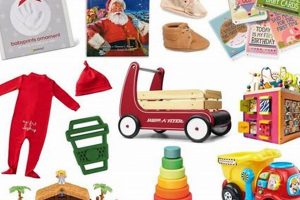Items presented to newborns and their families that reflect Christian values and beliefs constitute a specific category of presents. These offerings often include, but are not limited to, Bibles for children, devotional books, framed scripture verses, and toys or decor featuring religious symbols such as crosses or angels. These items serve as tangible expressions of faith and well-wishes for the child’s spiritual upbringing.
The practice of giving religiously themed presents to newborns holds significance for families who wish to instill their faith from an early age. Such gifts can serve as constant reminders of spiritual principles, offering comfort, guidance, and inspiration throughout the child’s development. Historically, these types of presents have played a role in reinforcing cultural and religious traditions within families and communities, providing a link to shared beliefs and values.
Considering the meaning and intention behind these faith-based offerings allows for a deeper understanding of their role in early childhood development and the expression of religious commitment. Subsequent discussions will explore the various types available, factors to consider when selecting them, and their potential impact on the child’s upbringing.
Guidance for Selecting Faith-Based Newborn Presents
Choosing suitable items for newborns that align with Christian beliefs requires careful consideration. This section provides guidance to aid in the selection process, ensuring the chosen presents are both appropriate and meaningful.
Tip 1: Consider the Age Appropriateness: Ensure that items, such as books or toys, are designed for infants and young children. Avoid items with small parts that could pose a choking hazard. A soft, plush toy with an embroidered cross is preferable to a toy with detachable pieces.
Tip 2: Prioritize Durable and Safe Materials: Select items constructed from non-toxic materials that can withstand frequent use and cleaning. Wood or organic cotton are often good choices for toys and textiles.
Tip 3: Focus on Biblically Sound Content: When selecting books or media, confirm that the content accurately reflects biblical teachings and promotes positive values. Consult reviews and previews when available.
Tip 4: Opt for Practical and Useful Items: Consider presents that serve a practical purpose, such as a blanket with a scripture verse embroidered on it or a diaper bag featuring a Christian design. Such items offer both functionality and spiritual encouragement.
Tip 5: Personalize the Present: Adding a personal touch, such as the child’s name or a special message, can make the present more meaningful and memorable. Custom embroidery or engraving are potential options.
Tip 6: Consider the Parents’ Preferences: Take into account the parents’ specific preferences and values when making a selection. A discrete inquiry about their preferred style or religious themes can be beneficial.
Tip 7: Emphasize Timelessness: Select items that will remain relevant and meaningful as the child grows. A quality Bible or a well-crafted piece of art can be cherished for many years.
By following these guidelines, individuals can select presents that are both appropriate and contribute positively to the child’s spiritual development and the family’s faith journey. These carefully chosen items can serve as lasting reminders of God’s love and grace.
The next section will delve into specific product suggestions that align with these recommendations, offering practical examples for those seeking suitable options.
1. Spiritual Nurturing
Spiritual nurturing, in the context of religiously themed infant presents, refers to the provision of stimuli and tools intended to foster a child’s developing understanding of and relationship with Christian principles. These items can act as catalysts, initiating early exposure to biblical stories, moral teachings, and the concept of faith. The causal link lies in the belief that consistent, age-appropriate exposure to religious content can shape a child’s worldview and cultivate a sense of spiritual identity from an early age. Consider, for instance, a set of wooden blocks featuring simple images representing key biblical figures or events; these can prompt discussions and lay the foundation for future theological comprehension.
The importance of spiritual nurturing within the realm of religiously themed presents is multifaceted. Such items serve as tangible representations of the family’s commitment to raising the child within a faith-based environment. A real-life example is the gifting of a personalized children’s Bible upon a child’s baptism. This signifies not only a symbolic acceptance into the Christian community but also the commencement of a lifelong journey of spiritual learning and development. Furthermore, these items can function as conversation starters, providing parents and caregivers with opportunities to share their beliefs and values with the child in a gentle and accessible manner. The long-term effect is the cultivation of a sense of belonging and connection to a larger spiritual community.
Understanding the connection between spiritual nurturing and faith-based infant presents offers practical significance for gift-givers. It encourages a shift from purely aesthetic considerations to a focus on the item’s potential to contribute to the child’s spiritual growth. Challenges lie in selecting items that are both age-appropriate and doctrinally sound, aligning with the family’s specific beliefs and values. Ultimately, the goal is to provide items that not only delight the child but also serve as enduring reminders of their spiritual heritage, fostering a lifelong connection to faith.
2. Age Appropriateness
Age appropriateness is a critical determinant in the selection of presents intended for newborns within a religious context. The cause and effect relationship is direct: inappropriately selected items can present physical hazards or fail to resonate with the child’s developmental stage, negating their intended spiritual impact. The selection of items unsuitable for infants, such as books with complex theological concepts or toys with small, detachable parts, would be unproductive. For example, a board book illustrating simple Bible stories with durable pages and rounded edges is conducive to early learning, while a delicate porcelain figurine is inherently unsuitable for an infant.
The importance of age appropriateness as a component of religiously themed presents lies in its facilitation of early learning and engagement. Presents selected to match a baby’s developmental stage encourage exploration and interaction. A real-life example involves gifting a soft, plush lamb toy with embroidered scripture verses. The texture and form are safe and comforting for an infant, while the embroidered message introduces religious elements in a gentle manner. Furthermore, age-appropriate items avoid overwhelming the child, allowing for gradual assimilation of religious concepts in a safe and engaging way. Musical mobiles playing gentle hymns, designed for secure attachment to a crib, are suitable examples of presents that stimulate the baby’s senses while also conveying a religious message.
Understanding the link between age appropriateness and religiously themed presents offers practical significance for gift-givers aiming to contribute positively to a child’s early development. The challenge lies in discerning the appropriate level of complexity and ensuring the physical safety of items intended for very young children. The goal is to select presents that not only reflect the gift-giver’s religious values but also align with the child’s cognitive and motor skill development. Prioritizing age appropriateness allows gifts to serve as both comforting and educational tools within a religiously-informed environment, contributing to the child’s holistic development.
3. Doctrinal Soundness
Doctrinal soundness is a principal consideration when selecting religiously themed presents for infants. Its importance lies in ensuring that the items presented accurately reflect established Christian teachings and do not misrepresent or contradict core beliefs. This is paramount for families seeking to introduce their child to the Christian faith from an early age.
- Accurate Representation of Biblical Narratives
Items depicting biblical stories must adhere to the core tenets of the narratives as presented in scripture. For example, a children’s Bible storybook should accurately portray events such as the Nativity or the Resurrection. Misinterpretations or embellishments can instill inaccurate perceptions and undermine the child’s understanding of Christian history and theology. The implications extend to ensuring that artistic depictions align with traditional understandings to avoid creating misconceptions.
- Theological Consistency
Presents incorporating theological concepts, such as the nature of God or the significance of salvation, must be consistent with accepted Christian doctrine. A gift that presents a distorted or heretical view of these concepts could be detrimental to the child’s spiritual development. An example would be a children’s song or story that minimizes the importance of Christ’s sacrifice or presents a universalist view of salvation that contradicts traditional Christian teachings.
- Ethical and Moral Values
Items intended to impart ethical or moral values must align with the principles outlined in the Bible. A book designed to teach kindness and compassion should reflect the teachings of Jesus, such as the parable of the Good Samaritan. Conversely, content that promotes values contrary to Christian ethics would be inappropriate. This ensures that the presents contribute to the child’s moral formation in accordance with Christian ideals.
- Denominational Alignment
Differences in denominational perspectives may impact the selection. While core doctrines remain consistent across many Christian denominations, nuances in interpretation and practice exist. The presents given should reflect the specific denominational affiliation of the family, if relevant. For instance, imagery favored in Catholic traditions might differ from those common in certain Protestant denominations. This demonstrates sensitivity to the family’s specific religious identity.
In summary, adherence to doctrinal soundness in religiously themed presents for infants is critical for providing an accurate and consistent foundation for the child’s spiritual development. It is not simply a matter of personal preference, but a commitment to presenting the Christian faith in a responsible and truthful manner. Careful consideration of these facets will contribute to gifts that both delight and edify.
4. Safety Standards
Adherence to established safety standards is paramount when selecting items for infants, especially within the domain of religiously themed presents. These standards are designed to mitigate potential hazards and ensure the well-being of the child. Compliance with these regulations is not merely a legal obligation but a moral imperative when providing products intended for vulnerable infants.
- Material Composition and Toxicity
Materials used in the construction of infant items must be non-toxic and free from harmful chemicals such as BPA, phthalates, and lead. Exposure to these substances can have detrimental health effects, particularly during early development. For example, a wooden cross intended as a crib ornament should be finished with a non-toxic paint or sealant to prevent ingestion of harmful substances. Rigorous testing and certification by independent laboratories are essential to verify the safety of materials used in religiously themed infant presents.
- Choking Hazard Mitigation
Infant items must be designed to minimize the risk of choking. Small parts, detachable components, and loose fibers pose a significant threat to infants, who have a natural tendency to explore objects orally. Presents should adhere to size regulations and undergo testing to ensure that they cannot be easily swallowed. A plush toy depicting Noah’s Ark, for example, should have securely attached animals and no small, removable pieces that could become lodged in a child’s throat. The absence of small parts is vital for items marketed to infants.
- Structural Integrity and Durability
Infant items should possess sufficient structural integrity to withstand normal use and handling. Weak seams, fragile construction, and easily broken components can create hazards that could lead to injury. A mobile featuring angels, intended to be hung above a crib, must be constructed from durable materials and securely attached to prevent it from falling and potentially harming the infant. Quality control and robust construction practices are necessary to ensure the longevity and safety of these items.
- Flammability Resistance
Textiles and fabrics used in infant items should exhibit flame resistance to minimize the risk of fire-related injuries. Regulations mandate that fabrics used in clothing, bedding, and plush toys meet certain flammability standards. A baptismal gown or a blanket embroidered with a scripture verse must be made from flame-resistant materials to provide a measure of protection in the event of a fire. Adherence to flammability standards is crucial for ensuring the safety of textiles used in religiously themed presents.
These components highlight the essential role of safety standards in relation to religiously themed infant presents. Upholding these standards not only protects infants from potential harm but also reflects a commitment to ethical sourcing and responsible manufacturing practices. Parents and gift-givers must prioritize safety certifications and scrutinize product details to ensure that infant items align with the highest standards of safety and well-being.
5. Parental Alignment
Parental alignment constitutes a pivotal factor when selecting religiously themed presents for infants. It signifies the congruence between the values and beliefs of the parents and the messages conveyed by the present. Such harmony is essential for reinforcing the family’s faith identity and ensuring the gifts contribute positively to the child’s spiritual development.
- Doctrinal Consistency with Family Beliefs
Presents should reflect the specific theological interpretations and denominational affiliations held by the parents. Gifting an item that promotes views divergent from the family’s established beliefs can create dissonance and undermine the parents’ efforts to instill their faith. A family adhering to a specific interpretation of baptism, for instance, would require presents that reflect that understanding. Conversely, ignoring these nuances can lead to conflict and render the gift ineffective.
- Alignment with Child-Rearing Philosophies
Presents should complement the parents’ approaches to raising their child. Some parents may prioritize structured learning, while others may favor a more organic approach to faith development. A parent who prefers hands-on learning may appreciate a set of biblical figures for interactive storytelling, while a parent who values literature may prefer a beautifully illustrated children’s Bible. Disregarding these preferences can result in a gift that is underutilized or clashes with the family’s parenting style.
- Consideration of Personal Sensitivities
Parents may have sensitivities regarding specific imagery, symbolism, or artistic representations within a religious context. Gifting an item featuring depictions that the parents find objectionable or controversial can cause offense and undermine the intended positive message. Some families may prefer traditional artistic styles, while others may favor modern interpretations. Awareness of these sensitivities is crucial to avoid causing unintended offense.
- Respect for Cultural and Ethnic Traditions
Religious beliefs often intertwine with cultural and ethnic traditions. Presents should demonstrate sensitivity toward these intersecting identities. A family from a particular cultural background may have specific customs or rituals associated with religious celebrations. Gifting an item that honors these traditions can strengthen the family’s sense of belonging and identity. Conversely, ignoring these cultural nuances can lead to a lack of resonance and diminish the gift’s significance.
In conclusion, parental alignment is a determining factor in the success of religiously themed infant presents. By ensuring the gifts resonate with the parents’ values, beliefs, and cultural background, the presents can become valuable tools for reinforcing faith and fostering a strong spiritual foundation for the child. Careful consideration of these aspects demonstrates respect and sensitivity, enhancing the gift’s significance and impact.
Frequently Asked Questions
The following addresses common inquiries regarding the selection, appropriateness, and significance of faith-based presents for newborns.
Question 1: What constitutes a suitable religiously themed present for an infant?
Appropriate items encompass a range of options, including age-appropriate Bibles, board books with simplified biblical stories, soft toys featuring religious symbols, and nursery decor incorporating scripture verses. Emphasis should be placed on safety, durability, and accurate representation of Christian teachings.
Question 2: At what age is it appropriate to introduce religiously themed presents?
Introducing such items is generally acceptable from birth. Sensory-rich items, such as soft toys or musical mobiles featuring hymns, can engage infants from an early age. As the child develops, age-appropriate books and interactive toys can be gradually introduced.
Question 3: How can individuals ensure that a religiously themed present is doctrinally sound?
Verification of doctrinal accuracy necessitates careful examination of the content and messaging conveyed by the item. Consultation with religious leaders or individuals knowledgeable in Christian theology may be beneficial. Products endorsed by reputable Christian organizations often offer assurance of doctrinal soundness.
Question 4: Are there potential risks associated with giving religiously themed presents to infants?
Risks are minimal, provided that items adhere to established safety standards and are age-appropriate. Caution should be exercised to avoid items with small parts or toxic materials. Furthermore, presenting religious concepts in a gentle, non-coercive manner is essential to avoid potential emotional distress.
Question 5: How does the act of giving religiously themed presents contribute to a child’s spiritual development?
Such gifts can serve as tangible reminders of faith, creating opportunities for parents to introduce religious concepts and values from an early age. These items can foster a sense of connection to the Christian community and provide a foundation for future spiritual growth. The effectiveness of such presents is contingent upon consistent parental engagement and reinforcement of Christian teachings.
Question 6: What alternative options exist for those uncertain about selecting a specific religiously themed present?
Alternatives encompass charitable donations in the child’s name to organizations aligned with Christian values, contributions to the child’s education fund with a focus on Christian education, or the creation of a personalized prayer journal for the child. These alternatives offer opportunities to support the child’s development and well-being while upholding Christian principles.
Careful consideration of these questions enables individuals to make informed decisions when selecting faith-based presents for newborns. The underlying objective is to provide gifts that are both meaningful and beneficial to the child’s spiritual journey.
The subsequent section will explore the evolving trends within the market for religiously themed infant presents.
Christian Baby Gifts
This exploration has illuminated the multi-faceted considerations surrounding Christian baby gifts. The selection process necessitates attention to spiritual nurturing, age appropriateness, doctrinal soundness, safety standards, and parental alignment. These elements collectively contribute to the potential of these items to serve as meaningful expressions of faith and valuable tools for early spiritual development.
The careful and conscientious selection of Christian baby gifts carries implications beyond the immediate presentation. These items can serve as enduring reminders of a family’s commitment to faith, fostering a connection to Christian values and traditions from the earliest stages of life. This commitment warrants thoughtful deliberation, ensuring that the presents chosen align with both the spiritual aspirations and practical needs of the child and family.







